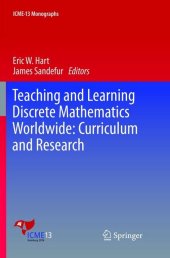 Neuerscheinungen 2019Stand: 2020-02-01 |
Schnellsuche
ISBN/Stichwort/Autor
|
Herderstraße 10
10625 Berlin
Tel.: 030 315 714 16
Fax 030 315 714 14
info@buchspektrum.de |

Eric W. Hart, James Sandefur
(Beteiligte)
Teaching and Learning Discrete Mathematics Worldwide: Curriculum and Research
Herausgegeben von Hart, Eric W.; Sandefur, James
Softcover reprint of the original 1st ed. 2018. 2019. xii, 276 S. 84 SW-Abb. 235 mm
Verlag/Jahr: SPRINGER, BERLIN; SPRINGER INTERNATIONAL PUBLISHING 2019
ISBN: 3-319-88921-4 (3319889214)
Neue ISBN: 978-3-319-88921-4 (9783319889214)
Preis und Lieferzeit: Bitte klicken
This book discusses examples of discrete mathematics in school curricula, including in the areas of graph theory, recursion and discrete dynamical systems, combinatorics, logic, game theory, and the mathematics of fairness. In addition, it describes current discrete mathematics curriculum initiatives in several countries, and presents ongoing research, especially in the areas of combinatorial reasoning and the affective dimension of learning discrete mathematics.
Discrete mathematics is the math of our time.´ So declared the immediate past president of the National Council of Teachers of Mathematics, John Dossey, in 1991. Nearly 30 years later that statement is still true, although the news has not yet fully reached school mathematics curricula. Nevertheless, much valuable work has been done, and continues to be done. This volume reports on some of that work. It provides a glimpse of the state of the art in learning and teaching discrete mathematics around the world, and it makes the case once again that discrete mathematics is indeed mathematics for our time, even more so today in our digital age, and it should be included in the core curricula of all countries for all students.
Part I: The Landscape of Discrete Mathematics in the School Curriculum
Discrete Mathematics is Essential Mathematics in a 21 st Century School Curriculum (and introduction to this volume)
Eric W. Hart and W. Gary Martin
The Absence of Discrete Mathematics from Primary and Secondary Education in the United States ... and Why that is Counterproductive
Joseph G. Rosenstein
Discrete Mathematics in Lower School Grades? S ituation and Possibilities in Italy
Aaron Gaio and Benedetto Di Paola
Discrete Mathematics and the Affective Dimension of Mathematical Learning and Engagement
Gerald A. Goldin
Part II: Combinatorics and Combinatorial Reasoning
Combinatorial Reasoning to Solve Problems
Tom Coenen, Frits Hof, and Nellie Verhoef
Children´s Combinatorial Counting Strategies and their Relationship to Mathematical Counting Principles
Karina Höveler
Reinforcing Mathematical Concepts and Developing Mathematical Practices through Combinatorial Activity
Elise Lockwood and Zack Reed
Complex Mathematics Education in the 21st Century: Improving Combinatorial Thinking based on Tamás Varga´s Heritage and Recent Research Results
Ödön Vancsó, Eliza Beregszászi, Hana Burian, György Emese, Eleonóra Stettner, and Judit Szitányi
Part III: Recursion and Recursive Thinking
Discrete Dynamical Systems: A Pathway for Students to Become Enchanted with Mathematics
Robert L. Devaney
How Recursion Supports Algebraic Understanding
James Sandefur, Kay Somers, and Rosalie Dance
Part IV: Networks and Graphs
Food Webs, Competition Graphs, and a 60-year-old Unsolved Problem
Margaret (Midge) Cozzens and Pratik Koirala
Graph Theory in Primary, Middle and High School
Daniela Ferrarello and Maria Flavia Mammana
Part V: Fair Decision-Making and Game Theory
Fairness
Sol Garfunkel
Mathematical Research in the Classroom via Combinatorial Games
Ximena Colipan
Machines designed to play Nim games (1940-1970): A possible (re)use in the modern French mathematics curriculum?Lisa Rougetet
Part VI: Logic and Proof
Mathematics and Logic: Their Relationship in the Teaching of Mathematics
Vladimir I. Igoshin


